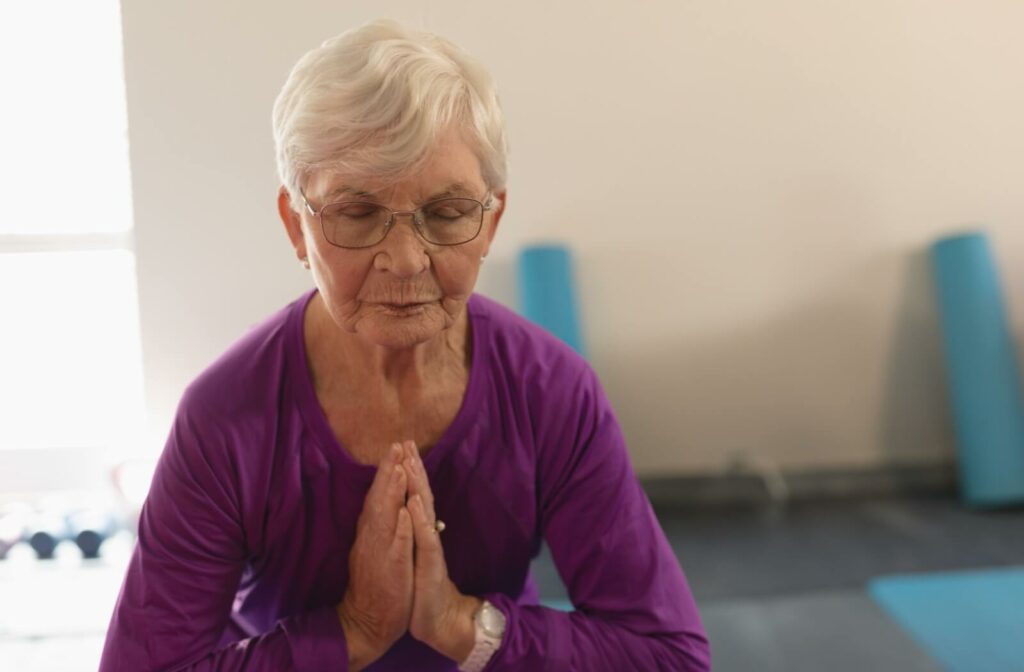Aging isn’t just about maintaining physical strength—it’s also about fostering peace of mind, emotional resilience, and mental clarity. Meditation can support older adults in all of these areas, offering tools to manage stress, navigate life changes, and promote a deeper sense of well-being.
Meditation can help seniors reduce anxiety, improve mood, manage pain, and support cognitive health. Regardless if a senior is living independently, with assisted living, or in a memory care program, meditation offers a gentle, accessible way to care for the mind and body in later life.
What Is Meditation?
Meditation is the practice of intentionally focusing your attention to increase awareness and calm. While it has roots in various spiritual traditions, it doesn’t require any particular beliefs. At its core, meditation helps people become more present and accepting of their thoughts, emotions, and surroundings.
Some of the most common forms of meditation include:
- Mindfulness meditation, which centers on present-moment awareness without judgment
- Loving-kindness meditation, which cultivates compassion toward self and others
- Body scans, which involve mentally checking in with each part of the body
- Breathwork, or controlled breathing to promote relaxation and focus
Meditation can be done sitting, lying down, walking, or even while engaging in creative activities. Its flexibility makes it especially accessible to older adults with varying levels of mobility.
How Meditation Supports Senior Wellness
Meditation offers a wide range of physical, mental, and emotional benefits. Here’s how it can positively impact seniors’ everyday lives.
Stress, Mood & Sleep: Emotional Benefits of Meditation
Life changes in older adulthood—retirement, health concerns, or the loss of loved ones—can be emotionally challenging. Meditation helps seniors better manage stress by calming the nervous system and breaking cycles of worry or rumination.
- Reduces stress hormones: Deep breathing and mindfulness lower cortisol levels
- Eases anxiety: Meditation supports emotional regulation and reduces anxious thinking
- Improves sleep: Regular practice can promote better rest and help with insomnia
- Supports mood: Meditation encourages greater awareness and emotional resilience
A 2021 meta-analysis found that mindfulness meditation significantly reduced depression symptoms in older adults, contributing to a more stable and positive mood over time.
Brain Health: Meditation’s Cognitive Benefits
Cognitive decline is a common concern among aging adults, but meditation may help slow or even reverse some of these changes.
- Improves focus and attention
- Enhances memory and recall
- Increases mental flexibility and clarity
Studies show that seniors who participate in mindfulness-based training perform better on cognitive assessments. Some research even points to increased connectivity within the brain’s default mode network, which is associated with memory and self-awareness and tends to decline with age.
Physical Wellness: Pain & Health Management
Meditation supports more than just the mind—it can also be a powerful tool for managing physical health challenges common in older adulthood.
Many seniors live with chronic pain from arthritis, neuropathy, or other conditions. Meditation can help reduce the brain’s sensitivity to pain by changing how pain signals are processed. Practices like body scans or guided imagery have been shown to reduce perceived pain and improve overall function.
Mindfulness-based practices have also been linked to improvements in several health concerns, including:
- Rheumatoid arthritis
- Type 2 diabetes
- Fibromyalgia
- Psoriasis
- Lower back pain
One study even found that seniors with mild cognitive impairment who participated in a mindful awareness program showed improvements in inflammation markers – an encouraging finding for those managing chronic health issues.
Gentle, Everyday Practices to Try
Meditation doesn’t need to be long or complicated to be effective. Even a few minutes a day can bring noticeable benefits. Some simple ways to incorporate mindfulness into daily routines include:
- Guided meditation recordings: Ideal for beginners and accessible via apps or audio devices
- Mindful breathing: Focused inhales and exhales that anchor attention
- Walking meditation: Slow, intentional movement combined with breath and awareness
- Mindful eating: Savoring each bite and staying present at mealtime
- Creative meditation: Coloring, drawing, or knitting with mindful attention
The key is consistency. Whether it’s a short breathing session each morning or a weekly group activity, small, regular practices build lasting habits.
Caution for Certain Individuals
While meditation is generally safe, it can sometimes surface uncomfortable emotions, especially for individuals with a history of trauma. For some, sitting quietly with their thoughts may feel overwhelming.
In these cases, it may be helpful to:
- Work with a trauma-informed mental health professional
- Choose more active or guided mindfulness practices
- Start with very short sessions and increase slowly
It’s important to honor individual needs and preferences. Meditation should never feel forced or distressing.
Bringing Mindfulness to Senior Living Communities
One of the many benefits of life in a senior living community is access to enrichment programs that support holistic well-being. Group meditation sessions, gentle movement classes, and relaxation workshops can offer residents a supportive space to explore mindfulness – while also building social connection and a sense of routine.
Programs like guided meditation or yoga not only improve physical and mental health but also create moments of joy, stillness, and self-reflection throughout the day.
Mindfulness at The Fairways: Supporting Memory Through Compassion
At The Fairways at Naples, we recognize the unique challenges that come with Alzheimer’s disease, dementia, and other memory-related conditions. That’s why our approach to memory care includes mindfulness-based practices tailored to the needs of individuals experiencing cognitive decline.
From guided meditation to sensory-based activities, our programs are designed to create calm, reduce agitation, and offer moments of connection and clarity. These practices can be especially helpful in managing anxiety, promoting emotional well-being, and enhancing quality of life for those living with memory loss.
If you’re exploring memory care options, we invite you to visit The Fairways at Naples and discover how we support meaningful, mindful living for residents with Alzheimer’s and dementia – every step of the way.

